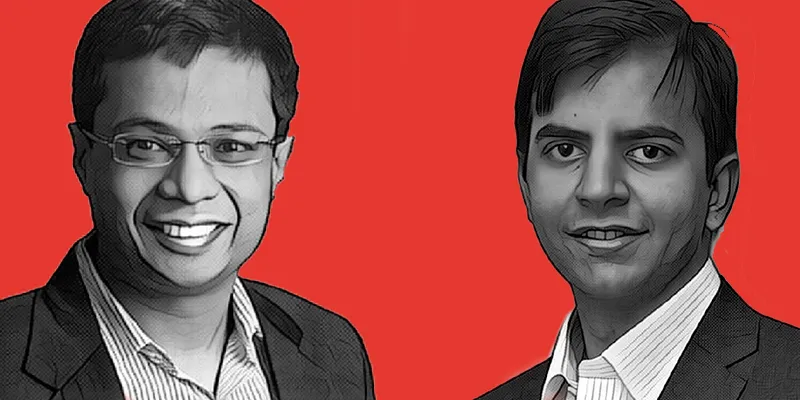Flipkart's Sachin Bansal tells the world, 'We need your capital, not your companies'
The world seems to be turning inwards. Globalisation no longer seems to be the buzzword, as China has shown with its ambitious domestic growth. The country's dominant search engine is Baidu, its e-commerce giant is Alibaba, and cab aggregator is Didi -- all homegrown giants.
However, India's search engine is still Google, our e-commerce giant is Amazon, and our preferred social media are Facebook and WhatsApp.
While Flipkart and Ola have established themselves as companies to reckon with, there is no denying that Uber and Amazon are giving desi companies a run for their money. Is it time for India to tighten the reigns like China did to ensure that domestic businesses grow, survive, and thrive?
In a rather heated debate at the Carnegie Global Summit in Bengaluru yesterday, Flipkart's Sachin Bansal and Ola's Bhavish Aggarwal took up the cudgels for Indian companies, batting for policies in favour of domestic businesses.
At a panel discussion that spanned policy help to capital dumping to service quality, the panel moderated by Mohandas Pai and comprising Sachin Bansal, Executive Chairman and Co-founder, Flipkart; Bhavish Aggarwal, Co-founder and CEO, Ola; Navneet Kapoor, President and Managing Director, Target India; Anand Rangarajan, Engineering Director, Google, held forth on Borders and innovations: Balancing the external and internal.

Irrational capital
Answering a question by YourStory on service qualities, Bhavish Aggarwal, said,
"Capital infusion is what pushes the impression of better service quality. That actually isn't the case. Uber's prices might be 15 percent lesser than ours, but our higher market share tells market truths and realities. Having more money isn't the answer, the global companies come in and put in predatory prices, which isn't fair to the local markets and not even sustainable."
The year hasn't been great for the Indian startup ecosystem. Was that the reason that the debate was so heated? No. The blue-eyed boys of the Indian startup ecosystem, Sachin and Bhavish, believe that India currently doesn't have a robust system that protects the consumer internet sector.
Protect consumer internet companies
Sachin believes that it isn't a new idea for governments to "protect" their own companies before opening up the economy to the world. He cited the examples of Japan, South Korea, and Singapore.
"Even in India, we have focused on self-reliance in sectors like telecom, chemicals, and the auto industry. These are examples where we have ensured healthy competition. But the consumer internet sector is very unique. China's answer was to close the markets (for foreign companies)," says Sachin.
When a ride goes to Uber, the jobs are moving to the US and not India (because the teams are sitting in the US). The data, they claim, is going to the US and doesn't benefit India.
"We need to create a level playing field, but that doesn't come with closing up of the economy," countered Navneet Kapoor, President, Target India.
National interest first
Did we see fear in the eyes of our own startup entrepreneurs? Most of the talk focussed on Sachin and Bhavish claiming that there is a 'glass-ceiling' with Indian policy makers, and they do not have a fair way to compete against the far deeper war chests that Amazon and Uber have. Bhavish said,
"Why do they have negative gross margins in India? It isn't just about innovation. We are innovating as well. If you look at the capital infusion, there isn't local capital available. It is much easier for non-Indian companies to raise investment. We need steps taken to protect Indian companies. It is unfair. I am just saying the facts, globally there is a fair way to compete. In the consumer internet industry, there isn't a fair way to compete. There is a lot of irrational capital. We need to focus on protecting Indian consumer internet companies."
While they agreed capital is important, especially global capital, they also said that India's biggest consumer internet companies need to be Indian, which focus on Indian problems, generate jobs for Indians, and to grow the Indian economy. Citing the example of China, Sachin pointed out that Alibaba initially raised a lot of foreign capital to conquer and fight eBay. He added,
"We need to do what China did -- we need to tell the world we need your capital and not your companies."
Though it seems great that Indian consumer internet companies want to protect themselves, what about the product and the end-consumer experience? Anand explained that global companies do better because their products are better and the user is the best judge.
"At the end of the day, if you give a great product and user experience, a consumer will come to you," Anand Rangarajan of Google pointed out.
The problem is multi-pronged. Indian startup giants definitely feel that Indian policy makers can do more to give them a better playing field and advantage. However, they also want the global investors to pump in money. Clearly, they want to have their cake and eat it too.







